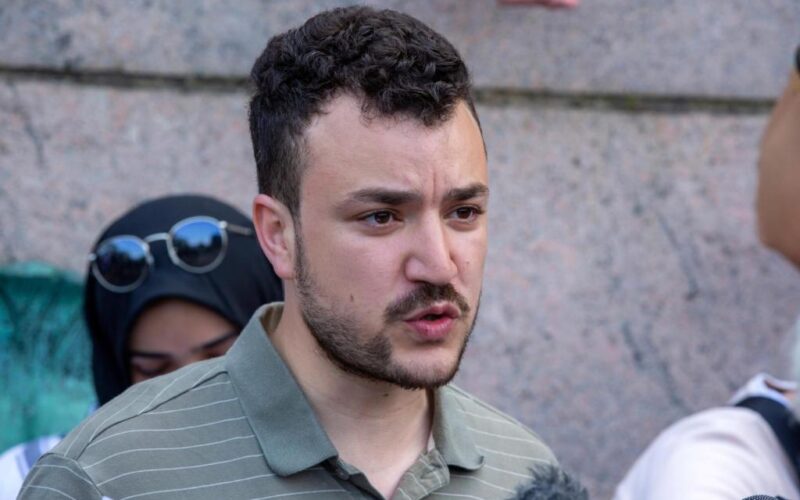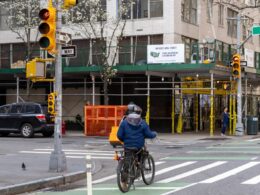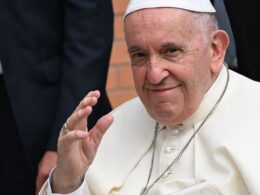Federal immigration authorities did not have a warrant for the arrest of Palestinian activist Mahmoud Khalil when he was taken into custody in the lobby of his Columbia University-owned apartment building last month, according to new filings Thursday in federal court.
Marc Van Der Hout, one of Khalil’s lawyers, accused Immigration and Customs Enforcement agents of misleading their client. Court documents show the feds logged in their arrest report that agents told Khalil there was a warrant for his arrest — yet the latest filings suggest no warrant was executed until he was transported down to an ICE office in Lower Manhattan for processing.
“The government’s admission is astounding,” Van Der Hout said in a statement, “and it is completely outrageous that they tried to assert to the immigration judge — and the world — in their initial filing of the arrest report that there was an arrest warrant when there was none.”
In response, Van Der Hout called on the immigration court to terminate proceedings. The judge in that case, Jamee E. Comans, ruled earlier this month that Khalil could be forced out of the country as a foreign policy risk.
The Trump administration maintains that an immigration arrest without a warrant was not unusual, stating: “It is the pattern and practice of DHS to fully process a respondent once in custody.” The Department of Homeland Security and ICE, which is under the umbrella of DHS, did not immediately return a request for comment.
“Generally, a warrant of arrest must be obtained,” the court documents read. “However, an exception to the warrant requirement exists where the immigration officer has reason to believe that the individual is likely to escape before a warrant can be obtained.”
The filings were made ahead of a deadline this week in Khalil’s immigration case in Louisiana, which gave the Trump administration more time to submit evidence on its second ground for deporting Khalil: claims that he made misrepresentations on his green card application. Lawyers for Khalil deny the claims.
Separately, the federal judge in Khalil’s case in New Jersey — an independent legal action where the activist is challenging the constitutionality of his detention — asked for copies of the filings the following day, on Thursday.
Khalil also submitted an application for asylum in the United States, which was sealed to the public, his lawyers said.
Amy Greer, another lawyer for Khalil — who he had retained in response to a separate Columbia disciplinary action prior to being detained by the feds — said she was on the phone with Khalil, his wife and an agent on the night of the arrest.
“Those agents repeatedly failed to show us a warrant,” Greer said. “Today we now know why they never showed Mahmoud that warrant — they didn’t have one.”
As part of their rationale for a warrantless arrest, the government offered new claims that Khalil refused to cooperate with the federal agents and threatened to “leave the scene.” The supervisory agent, the court filings said, “believed there was a flight risk and arrest was necessary.”
Khalil’s lawyers denied the new allegations: “No one should take seriously the government’s patent lie, which it offers for the first time many weeks after the fact, that somehow Mahmoud was anything other than compliant when ICE agents unlawfully abducted him under cover of darkness,” said Ramzi Kassem, co-director of CLEAR, and another lawyer for Khalil.
Khalil continues to be held in an ICE detention facility in Jena, La., where he missed the birth of his first child on Monday after federal authorities denied his request for temporary release.
Khalil, 30, was detained by ICE agents on March 8 after returning home to his Columbia-owned apartment from an iftar dinner with his wife, a U.S. citizen from the Midwest. He was living in the U.S. as a lawful permanent resident with a green card. He was set to graduate in May after completing his master’s at Columbia’s School of International and Public Affairs in December.
The student played a leading role in last year’s campus protests about the rising death toll in Gaza in Israel’s war against Hamas and the university’s investment ties to Israel, acting as a mediator between Columbia administrators and student protesters.
The government has not accused Khalil of committing any crimes. It says that even if Khalil’s actions in the U.S. were “otherwise lawful,” his political beliefs could have unfavorable repercussions for the Trump administration’s foreign policy objectives.
Khalil was the first international student targeted in the current crackdown, which has seen hundreds detained, including a Russian scientist working on groundbreaking cancer research at Harvard who has been in ICE detention for two months.
Originally Published:








